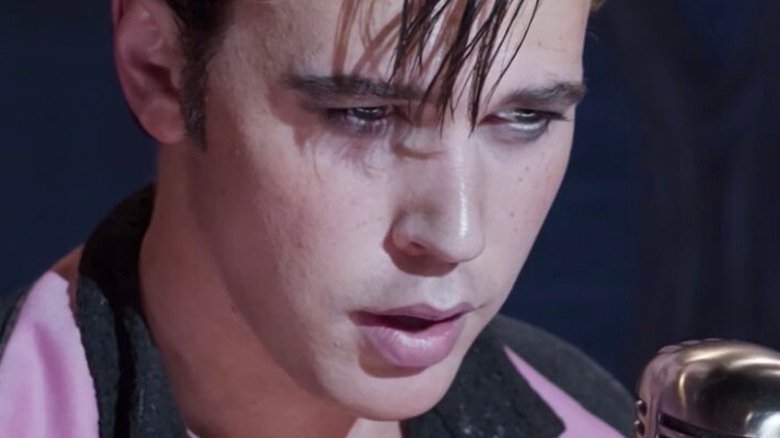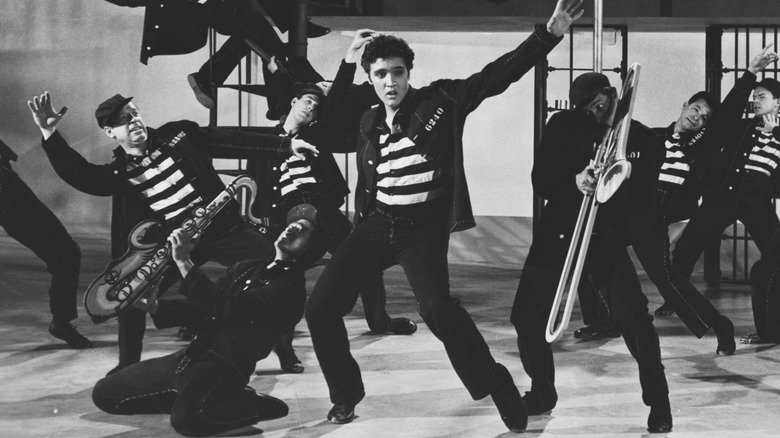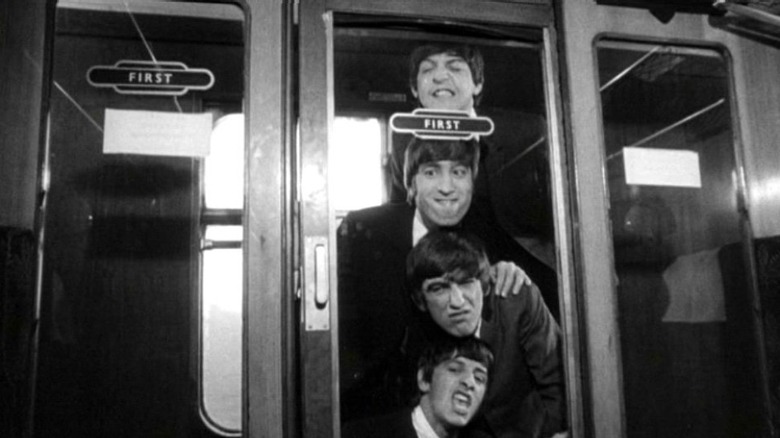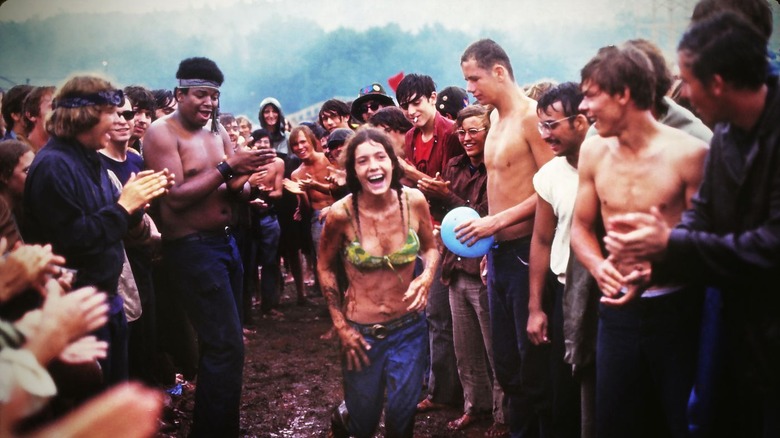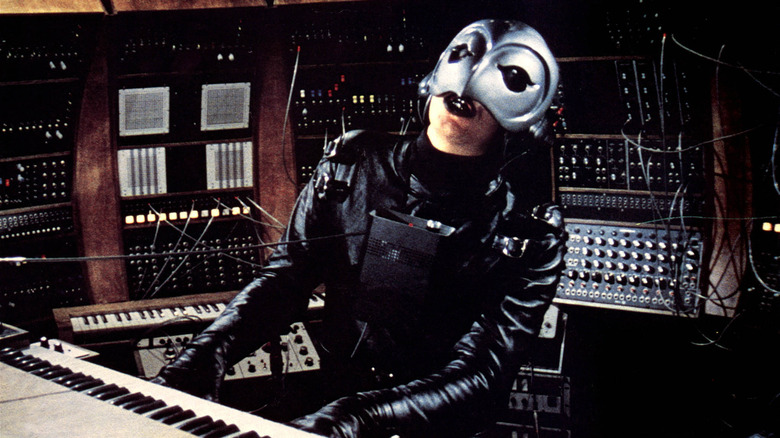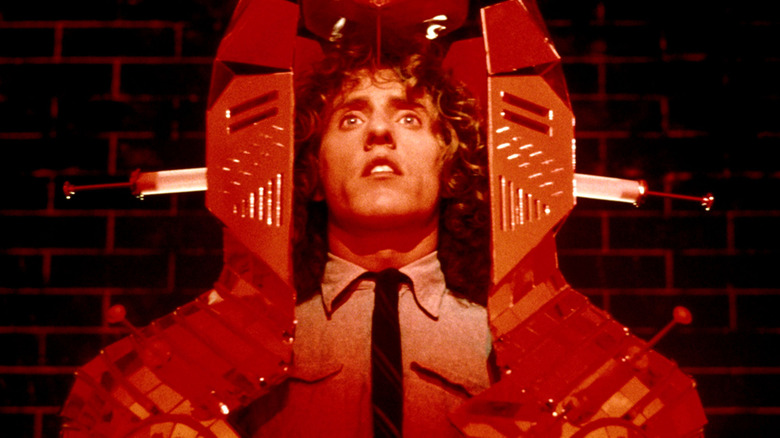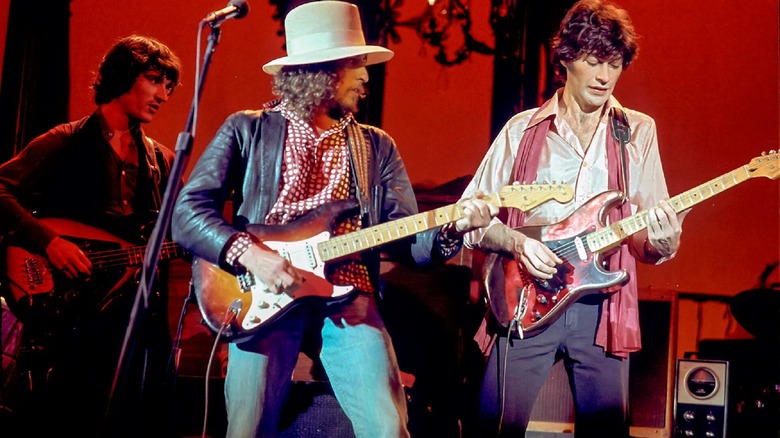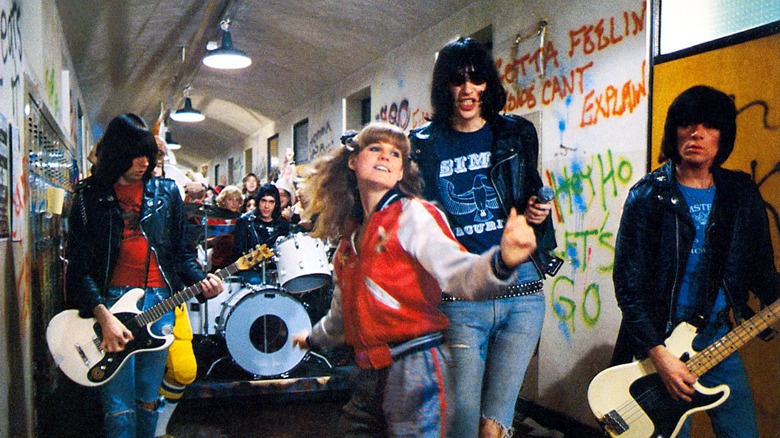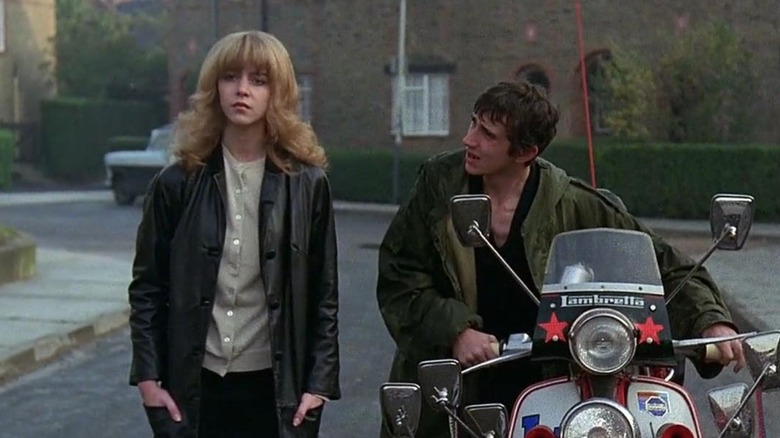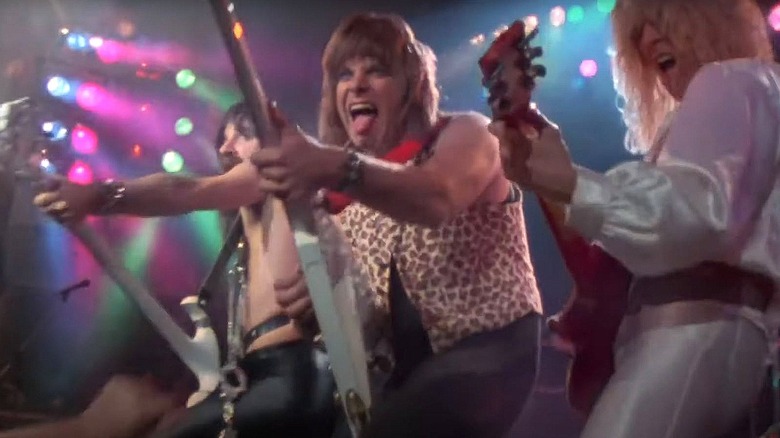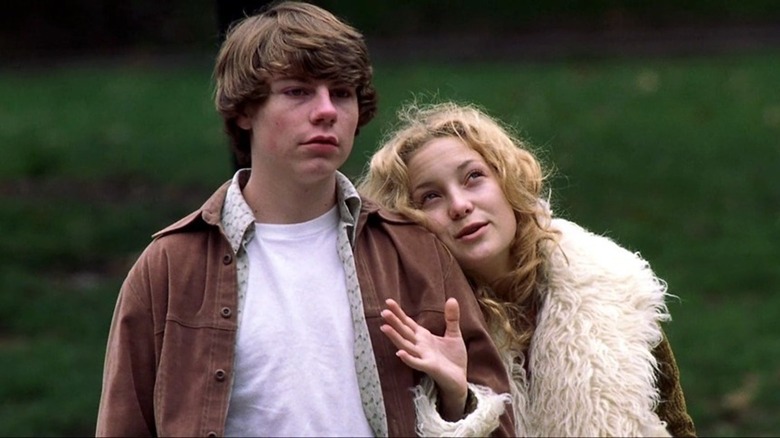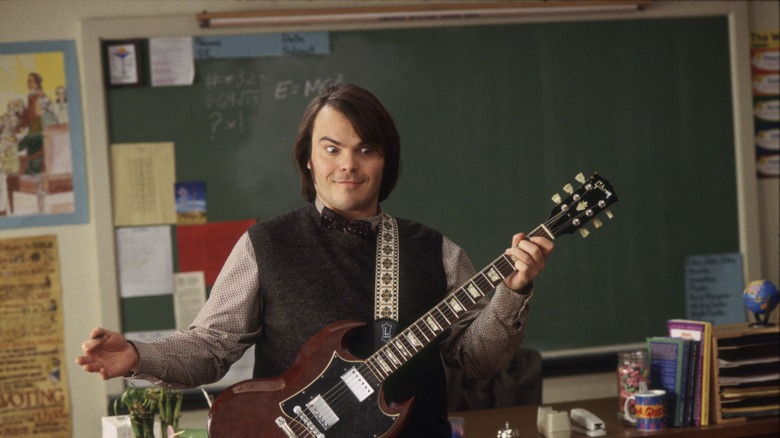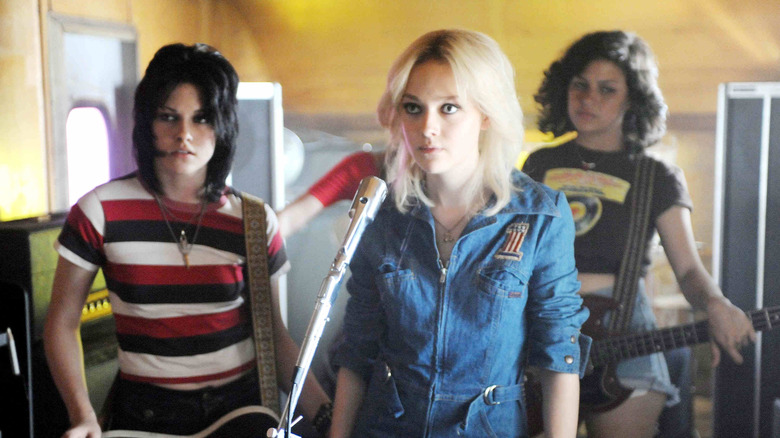The Greatest Rock And Roll Movies Of All Time
Every so often, a rock movie will come along to the nation's theaters, and music fans hope it will launch a revival of the genre. There have been rock movies since the explosion of rock and roll in the '50s, and such films have provided great visuals for the music long before we had MTV.
Rock movies had their heyday in the '60s and '70s. Whether it was the advent of MTV, or the current phenomenon of pay-per-view concerts, there hasn't been a truly great rock movie in quite some time, and it seems that every 10 years or so a new one comes along that fans hope can lead the resurgence, whether it's "The Doors," "Almost Famous," "The Runaways," or the latest biopic of "Elvis," which Warner Brothers released on June 24.
While a rock movie revival is long overdue, there have been many great rock films throughout history that hold up very well today. Here's our list of the greatest rock films in history, from the '50s to the '00s.
Jailhouse Rock
Before MTV exploded in the '80s, rock movies were a lucrative way to keep rock stars in the public eye, and hopefully sell a lot of albums. Elvis Presley starred in over 30 films, and he also made two theatrically released concert films. Throughout his career, Elvis made exciting movies that audiences loved, like "Viva Las Vegas," and movies that were ludicrous, like "Change of Habit," where a nun has to choose between Elvis or the Lord.
"Jailhouse Rock" was Elvis's third film, and it was his most iconic big screen appearance. The film created a fictional origin story where Elvis, playing a character named Vince Everett, goes to jail for manslaughter, and learns how to sing and dance during his stint in the big house. The title song, written by powerhouse songwriting duo Jerry Leiber and Mike Stoller, would also become one of The King's best-known hits.
"Jailhouse Rock" was added to the Library of Congress in 2005, and as critic Carrie Rickey wrote, "'Jailhouse Rock' remains the most eloquent record of two seismic events that rocked 1950s America: The rise of the teenager and the Elvis phenom."
Time magazine also listed Elvis's legendary performance of the title cut as one of the "Top 10 Movie Dance Scenes," and felt it was "one of the best music videos ever created before music videos existed, no less."
A Hard Day's Night
United Artists was one lucky studio in the '60s. They had the James Bond franchise and the Beatles making movies under their roof, and both were wildly successful.
As the head of United Artists, David Picker, recalled to Uncut, he asked the studio's London office if there were any up-and-coming rock bands they could potentially make movies with. The office suggested the Beatles, and after a meeting with band manager Brian Epstein, Picker agreed to produce a few low-budget pictures starring the group. Then the band performed for the Queen and appeared on "The Ed Sullivan Show." "Suddenly, it wasn't a little group from Liverpool," Picker continued. "It was the Beatles, and we had 'em."
"A Hard Day's Night" shows the Beatles during a crucial time in the Fab Four's history, capturing them at ground zero as they were becoming a phenomenon. It made the shoot difficult because they were already getting swarmed by fans. The film's soundtrack featured all new songs, and like all their recordings, it was a huge smash. Looking back on the film, The Independent wrote: "As invigorating and funny now as it was on its original release half a century ago, 'A Hard Day's Night' offers both a perfect showcase for the Beatles and an intriguing snapshot of fast-changing, early-1960s British society."
Woodstock
The Woodstock festival, which took place from August 15-18, 1969, came along at a critical time in America. All in the same month, we landed on the Moon, celebrated peace and love at the Woodstock fest, and were horrified by the Manson killings. Like "Jailhouse Rock," it captures an important moment in rock history, and the country's history as well.
While the film was three hours long, and the soundtrack album was an expensive three-LP set, both were big hits, and it was probably one of the first times the major studios saw the power of a rock soundtrack as a secondary income stream. (This was also the beginning of rock music being used on the soundtracks of major Hollywood films like "Easy Rider.")
Yet as Warner executive Fred Weintraub recalled in the book "Easy Riders, Raging Bulls," no one at the studio was supportive of "Woodstock." The studio had done a bunch of rock festival films, they all tanked, why would this one hit? The studio finally relented and the film made over $30 million worldwide.
"Woodstock" was edited down from more than 120 miles of footage. The film not only captured an important event at the end of the '60s, but also documented many great live performances from artists like The Who, Sly and the Family Stone, Santana, and more (one of the film's most legendary performances, Jimi Hendrix's rendition of "The Star-Spangled Banner," was captured as the festival was winding down).
Phantom of the Paradise
"Phantom of the Paradise," written and directed by Brian De Palma ("Scarface"), is a unique horror-comedy-rock musical retelling of "The Phantom of the Opera" and "Faust." It's also a parody of how over the top the world of rock and roll was becoming in the '70s, pre-dating "This is Spinal Tap." "Phantom" also has a similar satirical glam-rock vibe as "The Rocky Horror Picture Show," which came out a year later.
In "Phantom," legendary songwriter Paul Williams plays Swan, an evil record mogul and manager, and he also provides the music for the film. Jessica Harper plays Phoenix, muse to both Swan and the Phantom, who watches her perform while lurking around the theater. Dario Argento cast Harper in the horror classic "Suspiria" after seeing her in "Phantom."
"Phantom" was not a hit in its initial 1974 release, but it's a beloved cult favorite today, and it's also one of director Edgar Wright's favorite films. As the site Combustible Celluloid writes, "Filled with bizarre colors, vintage '70s-era rock and truly imaginative ideas, it's still a thrill."
Tommy
To many, Ken Russell, who loved classical music, may not have been the best choice to bring The Who's landmark rock opera "Tommy" to cinematic life. Why not have a guy who really understands rock and roll do it? But Russell loved The Who, and he brought a wildly eccentric vision to the story that has never been matched.
The tagline for the film told us, "Your senses will never be the same," and "Tommy" is indeed an insane sonic and visual explosion. "Tommy" features Roger Daltrey in the title role, and an all-star cast including Ann-Margret, Oliver Reed, Elton John, Jack Nicholson, and Eric Clapton, to name a few (the performances by Keith Moon and Tina Turner as Uncle Ernie and the Acid Queen are especially nuts).
"Tommy" has a freewheeling quality of reckless abandon that is sadly missing from movies today, not to mention from a lot of rock and roll these days as well. "Tommy" is completely over the top, visually groundbreaking, and clearly influenced a lot of music videos that came along in the next decade.
Variety wrote, "Ken Russell's filmization of 'Tommy' is spectacular in nearly every way," and the critical consensus on Rotten Tomatoes sums it up well: "'Tommy' is as erratic and propulsive as a game of pinball, incorporating The Who's songs into an irreverent odyssey with the visual imagination that only director Ken Russell can conjure."
The Last Waltz
Martin Scorsese has always been a big rock and roll fan (via Vice): it's a big driving force in his films, and he was an assistant director and editor on "Woodstock." Scorsese is also close friends with Robbie Robertson, guitarist from The Band, and he was the perfect choice to document their final concert, "The Last Waltz," which took place on November 25, 1976, at the Winterland Ballroom in San Francisco.
Joining the Band were special guests Bob Dylan, Neil Young, Joni Mitchell, Dr. John, Van Morrison, blues legend Muddy Waters, and even Neil Diamond, all performing together in an incredible once in a lifetime event.
"The Last Waltz" begins with a title card that says, "THIS FILM SHOULD BE PLAYED LOUD," and many critics have considered it the greatest concert film ever made. Rolling Stone felt the film "changed the way live music felt onscreen," while Time Out called it "arguably the most beautiful of rock movies."
Rock 'n' Roll High School
Produced by legendary B-movie king Roger Corman, "Rock 'n' Roll High School" is a throwback to the fun rock and roll films of the '60s, but with The Ramones bringing the music up to date.
The film was written without a specific band in mind, and several artists, including Todd Rundgren, turned it down. Once director Allan Arkush told the Ramones' managers that they would blow up the high school at the end of the film, they went wild: "We're in! We're gonna talk the boys into it!" (Corman actually considered renaming the film "Disco High," but Arkush told him, "You can't blow up a high school to disco music!")
The film also features a post-"Halloween" P.J. Soles, B-movie regular Paul Bartel as a stuffy music teacher who loves The Ramones, a funny set piece where the music of the Ramones causes lab rats to explode, and great live footage of the band playing the Roxy on the Sunset Strip. "Rock 'n' Roll High School" was ahead of its time in that it captured the Ramones when they were still a cult band. Today the band's legacy is bigger than ever, and they finally crossed over to mainstream popularity.
Quadrophenia
After the over-the-top bombast of the movie adaptation of "Tommy," The Who took a more realistic approach to adapting their other famous rock opera, "Quadrophenia," which was released as a double album in 1973. Unlike "Tommy," the film doesn't feature the actors singing the music, but is instead a straight dramatic film with the songs on the soundtrack.
The story deals with two English factions, the Mods and the Rockers, who are at war with each other. The film captures English youth who don't see a future for themselves, and the wars between the Mods and Rockers were a precursor to the future nihilism of the punk scene.
The film, like the Who's music, captures the era when they were exploding, and it is also timeless in its depiction of teen alienation. Creative Loafing wrote that the film "manages to be both quintessentially British and irrefutably universal," and critics gave high marks to Phil Daniels, who plays the main character in the film, Jimmy. The film also features Sting in the role of Mod leader Ace Face.
This is Spinal Tap
"This is Spinal Tap" is hands down the most accurate — if sidesplitting — portrait of a heavy metal band ever made, and it strikes a nerve with musicians of all genres.
So many rock bands have gone through the ridiculous misadventures of the fictional Spinal Tap, and for many musicians some of the jokes in the film hit too close to home. Just a few of the hilarious, and painfully true, segments include the band getting lost on the way to the stage, the infamous "Stonehenge" segment, the bassist getting trapped in the pod, and the humiliating gigs at an Air Force base and second on the bill to a puppet show at Magic Mountain.
As Harry Shearer, who played bassist Derek Smalls, said, "The closer we dared to get to the real thing, the closer the real thing dared to get to us. It's like reality is calling our bluff at every step along the way."
"Spinal Tap" was released right as the heavy metal genre was having a big comeback with bands like Quiet Riot and Motley Crue, and perhaps it came out a little too early to capitalize on the genre's success. But today it has proven to be a timeless satire that will always be relevant.
"Spinal Tap" is the only film that can be rated up to 11 on IMDb, and recently director Rob Reiner announced there will be a sequel. As Reiner said at the Cannes Film Festival (via Billboard), "The bar is high. There's no question about it."
Almost Famous
"Almost Famous" is yet another rock movie that didn't perform in its initial release, but it finally found its audience 20 years later. A semi-autobiographical film written and directed by Cameron Crowe ("Jerry Maguire"), "Almost Famous" follows Crowe's young surrogate, a kid named William Miller, on the road with Stillwater, an amalgam of several bands Crowe covered when he was a journalist for Rolling Stone.
While "Almost Famous" can be considered a sugar-coated fairy tale that turns a blind eye to the dark side of the music business, what it lacks in hard-hitting reality it more than makes up for with a lot of heart. In addition, "Almost Famous" features an excellent ensemble cast, with Kate Hudson in her breakout role, Billy Crudup, Philip Seymour Hoffman, and Jason Lee all turning in terrific performances.
For Crowe, "Almost Famous" was clearly a labor of love, as well as his most personal film, and it also earned him an Oscar for Best Original Screenplay.
School of Rock
With "School of Rock," writer-director Richard Linklater made a prime vehicle for star Jack Black and an inspirational comedy about the power of music — in fact, it inspired the real-life School of Rock franchise, which teaches kids music all over the country.
Screenwriter Mike White wrote the film specifically for Black, who knows how to bring music and humor hilariously together. Black told journalist Jim DeRogatis that White was inspired by an album from the Langley Schools Music Project, where a teacher in British Columbia taught his students the power of performing music.
As White recalled to Glide, "Black is a great performer, a terrific musician and the perfect antihero. He's kind of unhinged in that fun way Willy Wonka is, and I kept having this idea about him jamming around with a bunch of kids."
Time Out called the film "a cathartic class comedy for kids of all sizes," and David Ansen of Newsweek raved that the film "made me laugh harder than any movie I've seen this year." Peter Rainer also raved in New York magazine, "It would be a shame if only kids went to see this film. Adults who can still plug in to their inner rocker will love it too."
It may also be a testament to the film's quality that so many of the cast members of "School of Rock" have created such successful careers after appearing in the hit movie.
The Runaways
The Runaways were an all-girl teenage group that initially weren't taken seriously, but in later years they developed a new generation of fans, and earned their place in rock history as an inspiration for many female musicians.
While the gist of "The Runaways" is a rock and roll tale we've heard many times before, it's how director Floria Sigismondi tells the story that makes the film impressive. An acclaimed video director, Sigismondi gives "The Runaways" great visual flourish, and she perfectly captures how rock concerts and small clubs really sound and feel.
The film features strong performances from Dakota Fanning as Runaways singer Cherie Currie, Kristen Stewart as Runaways guitarist Joan Jett, and Michael Shannon, who absolutely steals the show as Kim Fowley, the band's reptilian, controlling manager.
In his review of the film, former MTV anchor Kurt Loder wrote, "”The Runaways' is a rock movie that gets so many things right, you want to forgive its awkward structure," while also noting that the film's ending was atypically poignant for the genre. Unlike a lot of rock movies which today enjoy healthy followings, "The Runaways" still hasn't gotten its due with audiences. Hopefully it will eventually find a fanbase, much like the band itself did years after they broke up.
